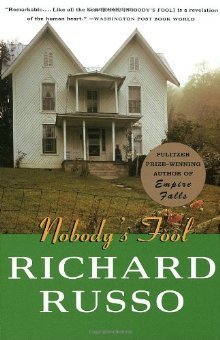TL;DR
Richard Russo's "Nobody's Fool" is a humorous and poignant exploration of life in a struggling town through the eyes of Sully, a down-on-his-luck man grappling with personal failures and familial ties.
What is Nobody's Fool about
"Nobody's Fool" delves into the life of Sully, a charismatic yet hapless man living in a dilapidated town in upstate New York. The narrative captures Sully's relationships, including his estranged son who is on a troubling path reminiscent of Sully's own poor choices. Russo's storytelling is a blend of humor and heart, portraying a community of flawed characters who, despite their shortcomings, display resilience and humanity. The novel is a celebration of life's unpredictability, the bonds of family, and the grace that can emerge from life's challenges.
Nobody's Fool 5 Key Takeaways
Introduction of Sully and his circumstances.
Sully is introduced as a man burdened by his choices, divorced and navigating life with a bum knee and a cast of eccentric friends. His reputation as a 'deadbeat' is well-established, setting the stage for his personal journey.
The arrival of Sully's estranged son.
Sully's son arrives back in town, creating tension and a sense of urgency as Sully realizes the risk of his son repeating his mistakes. This development serves as a catalyst for Sully's self-reflection.
Sully's interactions with townspeople.
Sully's interactions with the townsfolk reveal the deeply intertwined lives within the community. These relationships illustrate the humor and trials faced by each character, enriching the narrative.
Sully's quest for redemption.
As Sully confronts his past and his relationship with his son, the story shifts towards themes of redemption, forgiveness, and the possibility of change, culminating in a heartfelt climax.
Resolution and acceptance.
The novel concludes with Sully finding a measure of peace and acceptance, both with his son and his place in the world, offering a poignant reflection on personal growth.
Top Nobody's Fool Quotes
- "Sometimes, you have to just keep going to find your way back to yourself."
- "We all make mistakes, but it’s how we handle them that defines us in the end."
- "Life has a way of throwing curveballs, and it’s in those moments we discover who we truly are."
Who should read Nobody's Fool?
"Nobody's Fool" is ideal for readers who appreciate character-driven narratives infused with humor and depth. Fans of literary fiction that explores themes of family, redemption, and the complexities of community will find solace and inspiration in Russo's storytelling.
Nobody's Fool Best Reviews
- "A deftly woven tale of humor and melancholy, Russo's novel resonates with anyone who has faced life's unpredictability." - The New York Times
- "Nobody's Fool is a masterclass in character development, showcasing Russo's ability to blend wit with deep emotional truths." - The Guardian
People also liked these summaries
Nobody's Fool FAQs
Is "Nobody's Fool" part of a series?
No, "Nobody's Fool" is a standalone novel, though it shares thematic elements with Russo's other works set in similar small-town environments.
What genre does "Nobody's Fool" belong to?
"Nobody's Fool" falls under the genres of fiction and literary fiction, focusing on character development and social dynamics.
Are there any adaptations of "Nobody's Fool"?
Yes, "Nobody's Fool" was adapted into a film in 1994, directed by Robert Benton, which captures the essence of Russo's novel.
